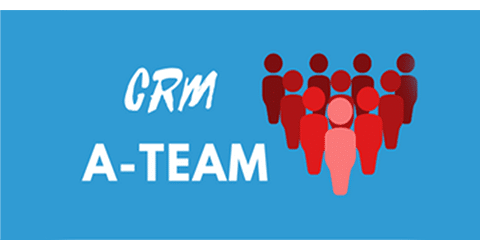Building Your CRM A-Team: The Roles Your CRM Needs to Succeed
From my personal experience working with CRM users over the last three years, most people reading this post will fall into one of the two following categories:
- You are researching and selecting a CRM platform and putting everything in place to deploy an optimized CRM within your organization. You are wondering what your CRM “A Team” needs to look like in order to deploy successfully.
- You already have a CRM and are currently rethinking the way your organization approaches your CRM team. Maybe you’ve been managing the CRM solo for a long time, or maybe no one at your organization has ever really owned the CRM role. Rethinking your CRM at this time means redefining the people who are considered stakeholders in your CRM platform.
Either way, keep reading to learn about the key roles in your CRM team (myth buster–it’s not just the CRM admin) who’s buy-in you need in order to have a robust, friendly CRM system that works for departments across your organization.
Why This is Important
If you are already thinking “this blog post isn’t relevant to us”, think again. We are going to highlight some existing organizational roles and why you should make them a part of your CRM team. This is important because your CRM isn’t going to be successful unless all the stakeholders are on board. It’s important to get these existing team members to understand why the CRM supports them and that they have involvement in determining what’s in it for them from the beginning.
Key Members
System Admin
The system admin (which might be you, since many of this blog’s readers are admins) is the person who will be the guiding light for the CRM team. They will be the reference for all CRM questions and issues and know their CRM system front and back. They will understand how to do everything from creating reports for managers, automate processes via workflows, and do mass updates to the system. Organizations will invest time, money, and training into this role to make sure the job is done well. The system admin should be filled by someone who is technical, who has worked with software before, and who isn’t afraid of challenging standards with innovation.
In our experience, if you don’t have anyone else on your “CRM Team”, you must at least have an admin. At a smaller organization, admins can be someone in another role who tacks on “system admin” to their title, or at a larger organization, someone whose sole responsibility is managing the CRM. The important thing is having someone own the CRM responsibilities. By defining who is accountable for CRM success, you are guaranteed higher user adoption, cleaner data, and internal resources to make CRM configurations.
Sales Stakeholder
The sales stakeholder on your CRM team is the person who will represent the needs of sales, help define sales automation in CRM, and also hold the sales team accountable for using the software. This is also the person who will benefit from getting high-level performance reports of CRM activity and sales. The person who will fill this role on your CRM team should be the person who is responsible for pipeline visibility, sales forecasting, and managing sales performance. This person is critical to your CRM team because they are the expert on your sales processes, and their buy-in will boost user adoption while they hold their team accountable for CRM use.
Finance Stakeholder
A financial leader at your organization needs to be on your CRM team because they care about ROI, they may be involved in approving the budget for the software, and they will need to be involved in setting up financial processes within the CRM (such as sales quotes and customer invoicing).
Head of IT
The person who heads IT will be interested in CRM security, hosting, integration with existing platforms, and customization capabilities. They are critical to the CRM team because they can advise the system admin on security best practices and data compliance. They can help select a platform/partners who offer good technical support, and potentially have their department do code-level customizations.
Champion Users
Often underappreciated, these stakeholders are the most powerful tool you have as a CRM admin or CRM project leader (and you should make them feel that way). The champion users are the sales reps, marketing coordinators, and call center specialists who use the system. Their user adoption is key to system performance. They are also the people you can use to connect with users or stakeholders in their respective departments. Champion users in each department can bubble up issues and suggestions for improvement, and also assist other users within their departments with questions and help requests (so the admin’s workload can be lighter).
Resources
Now you’re probably thinking…”How am I supposed to put together a full team of CRM people? This sounds expensive.” That is simply not the case. This list of roles can be fulfilled by people that are already within your organization–the point is that you need to have people accountable for each of these buckets of responsibilities. There may be individuals who will handle more than one of these “roles”, especially if you are at a smaller company.
There’s also one resource you might not be thinking of–your partner. Your partner is someone who doesn’t necessarily know your business as well as you do, but they do know your CRM software platform, the CRM industry, and software best practices better than anyone else. And you know this because you chose them to be your CRM partner (you wouldn’t go with anything other than the best, right?). If you aren’t able to find the above team members within your organization, your CRM partner should be able to help you fill in the gaps and work alongside your team, basically acting as an extension of yours.
If you already have a CRM, how do you organize your CRM responsibilities throughout the organization? Let us know here.



